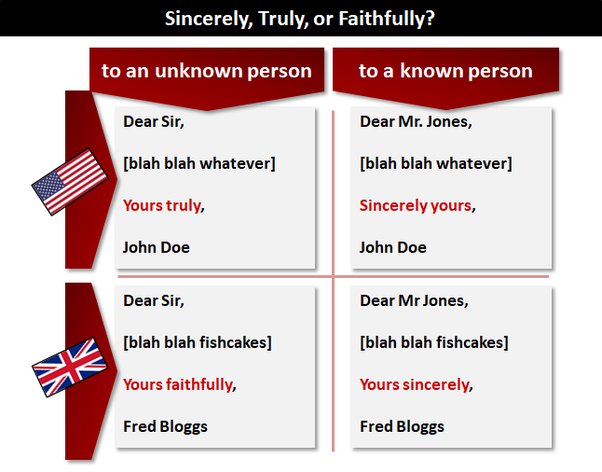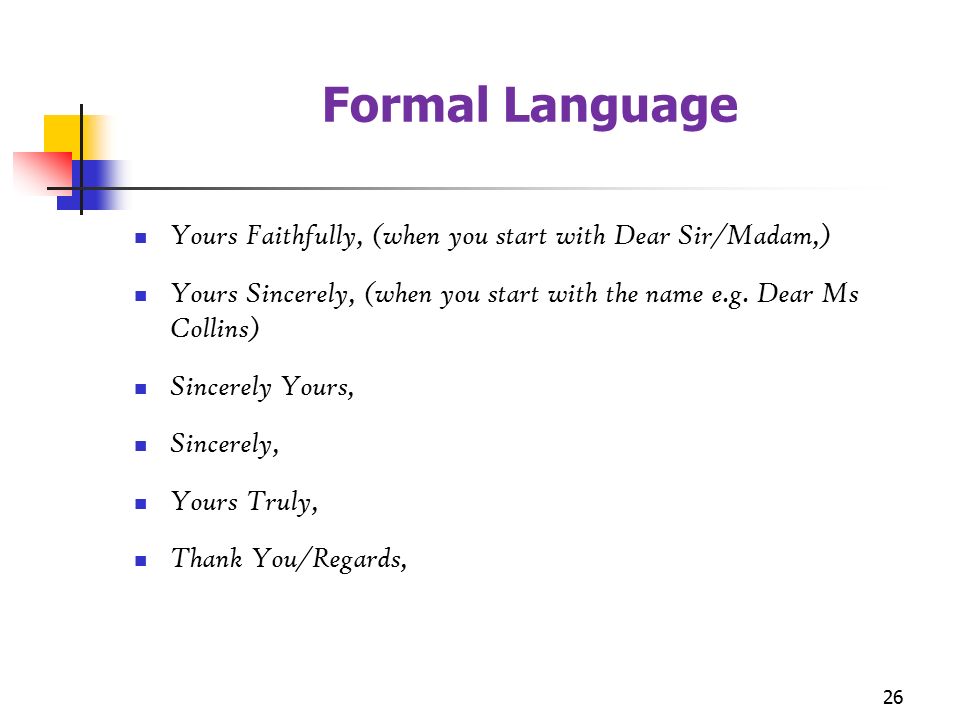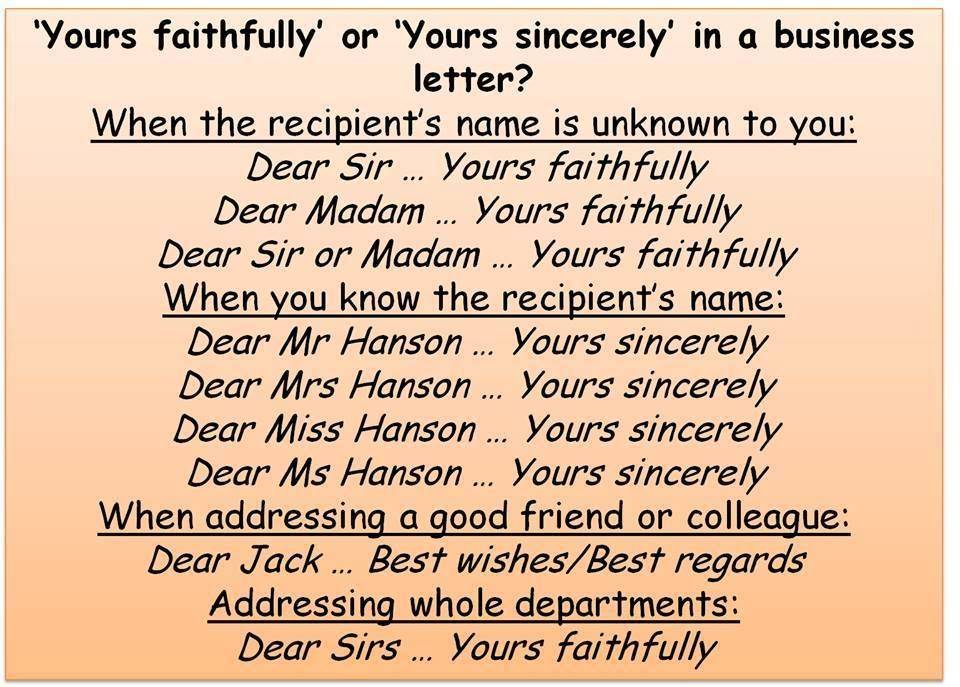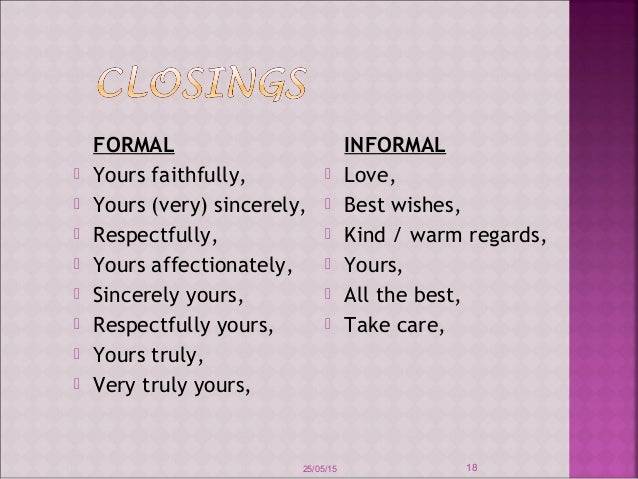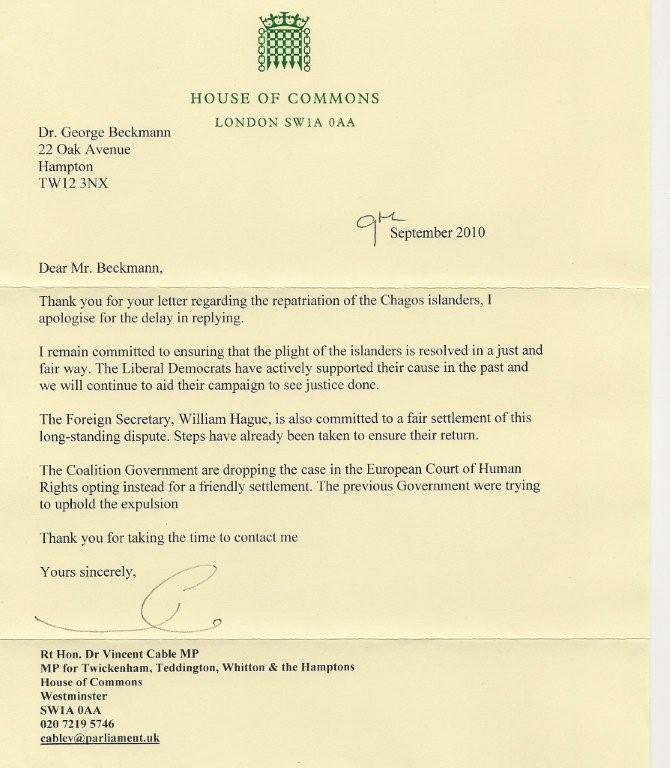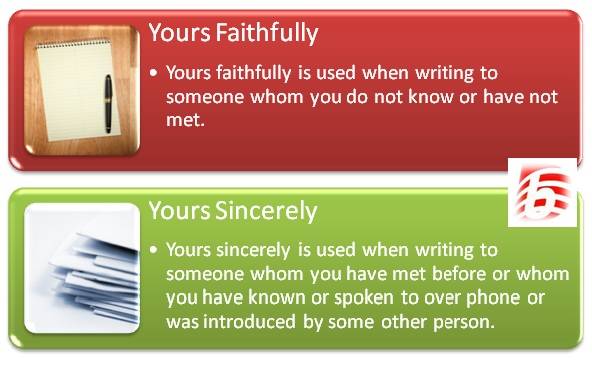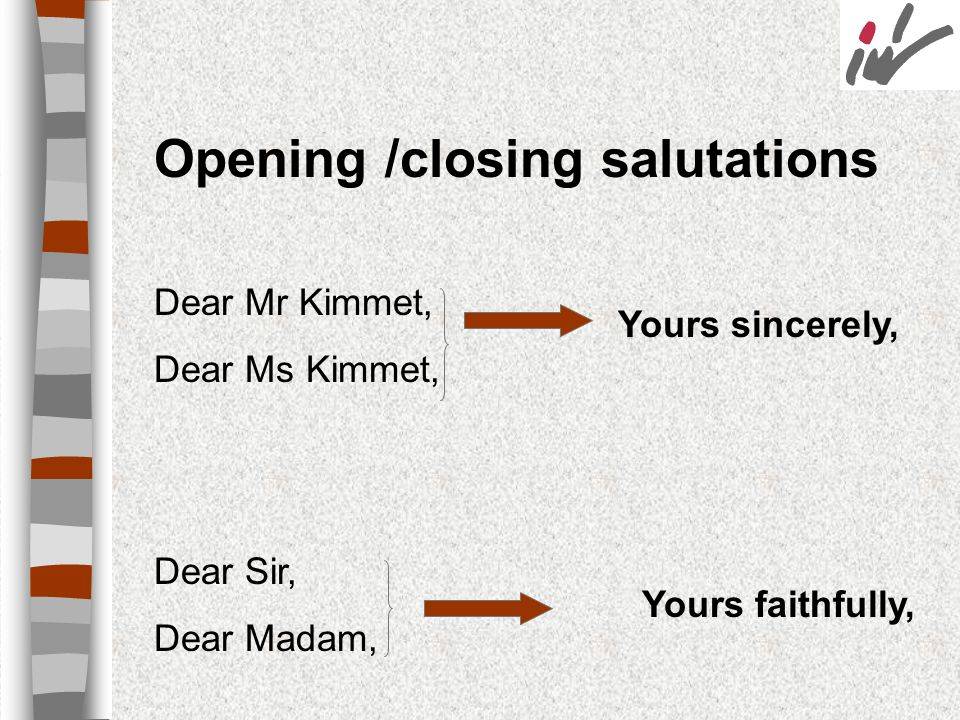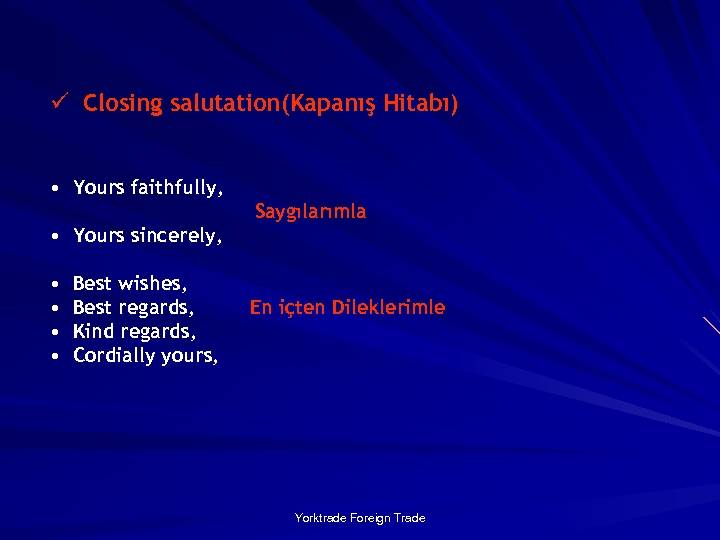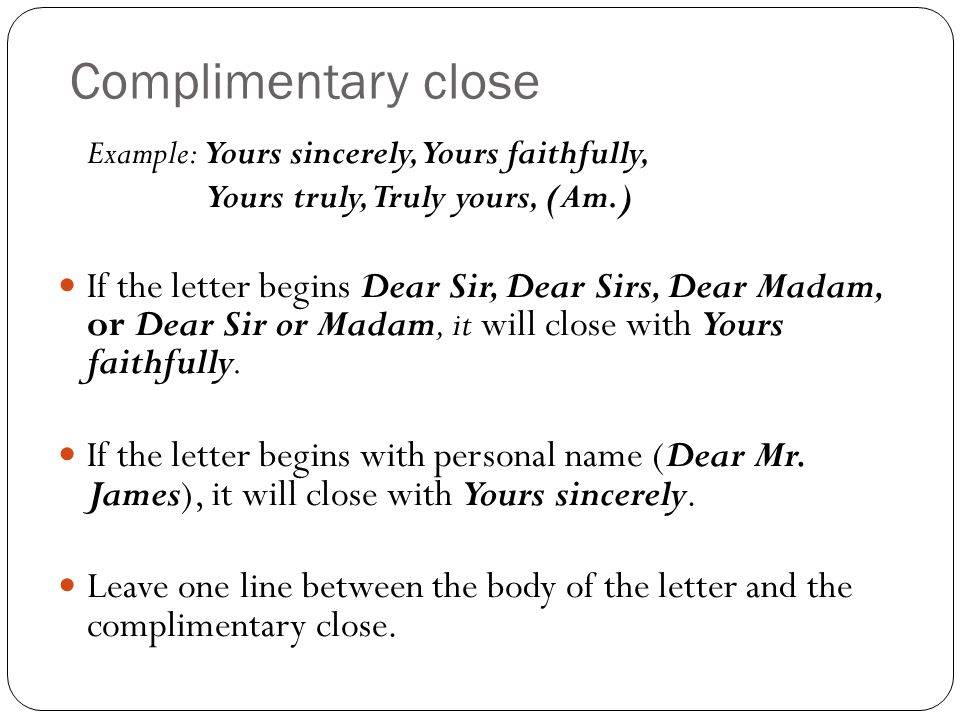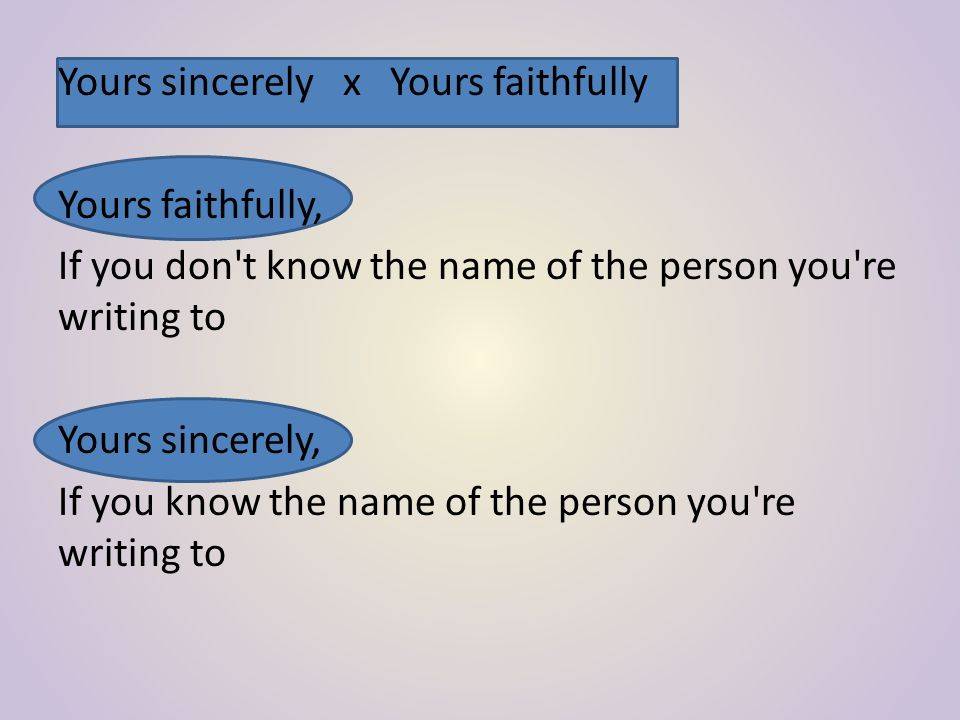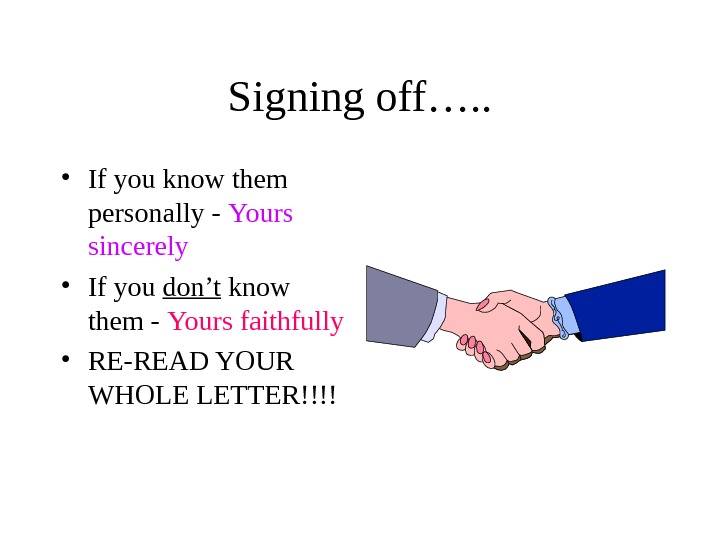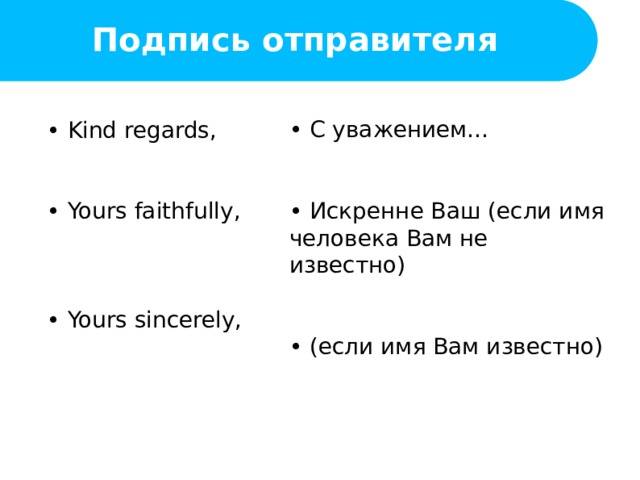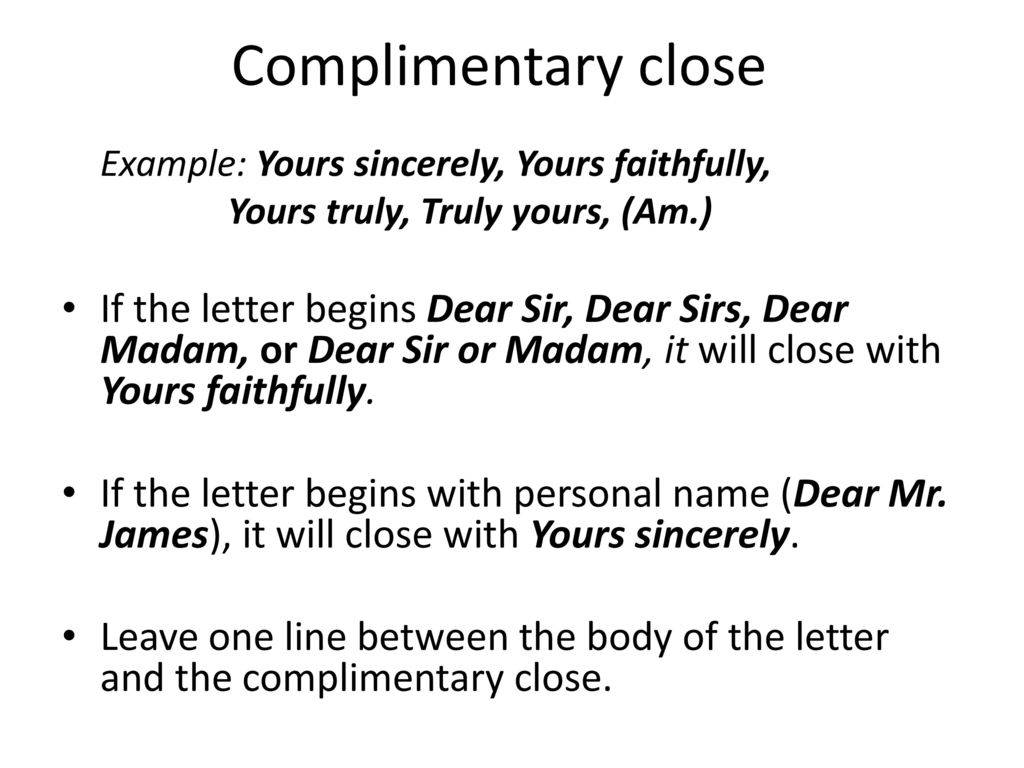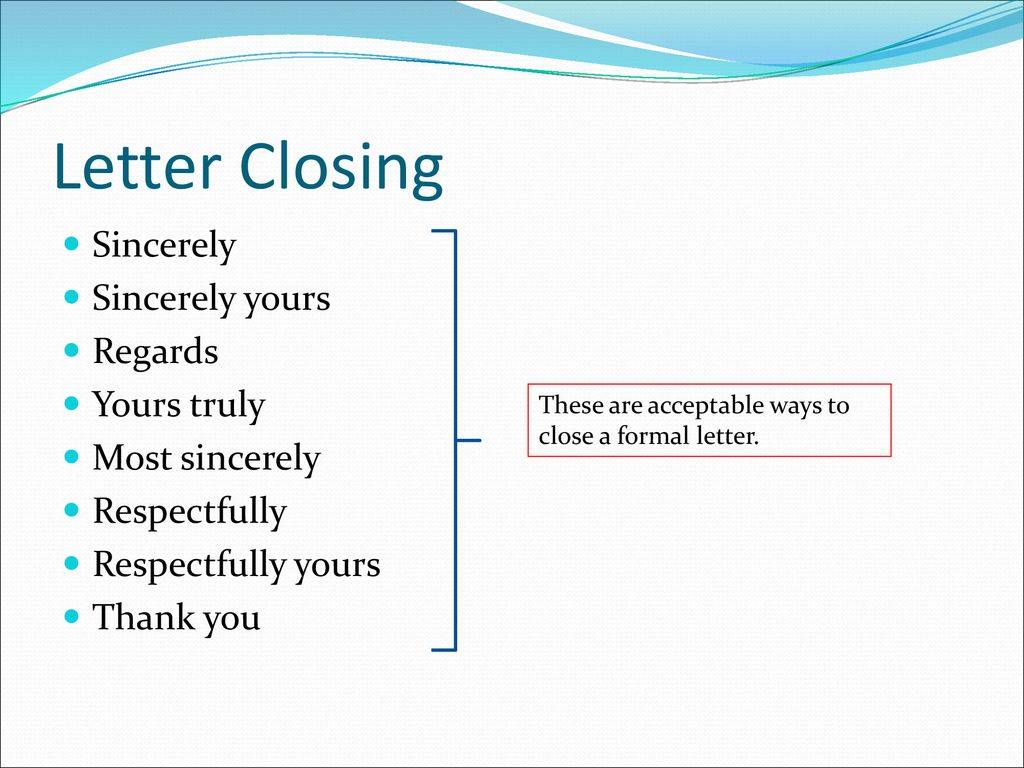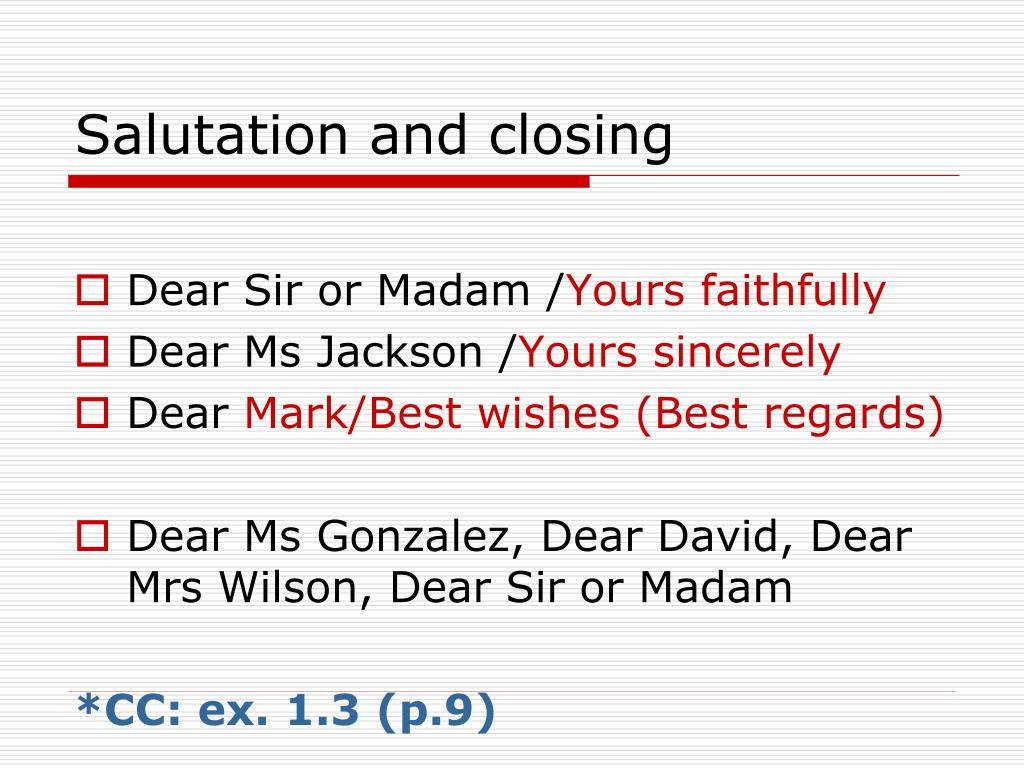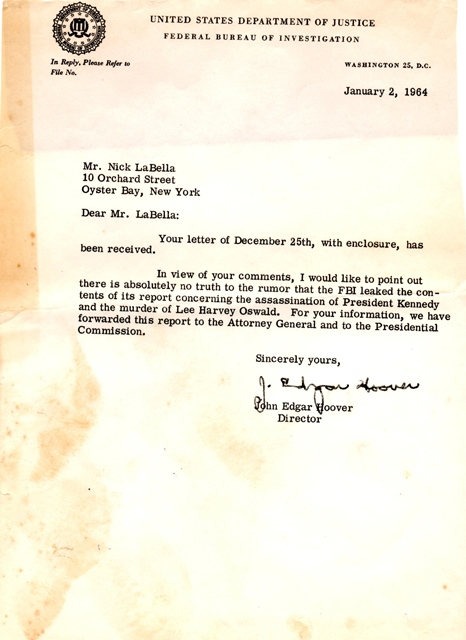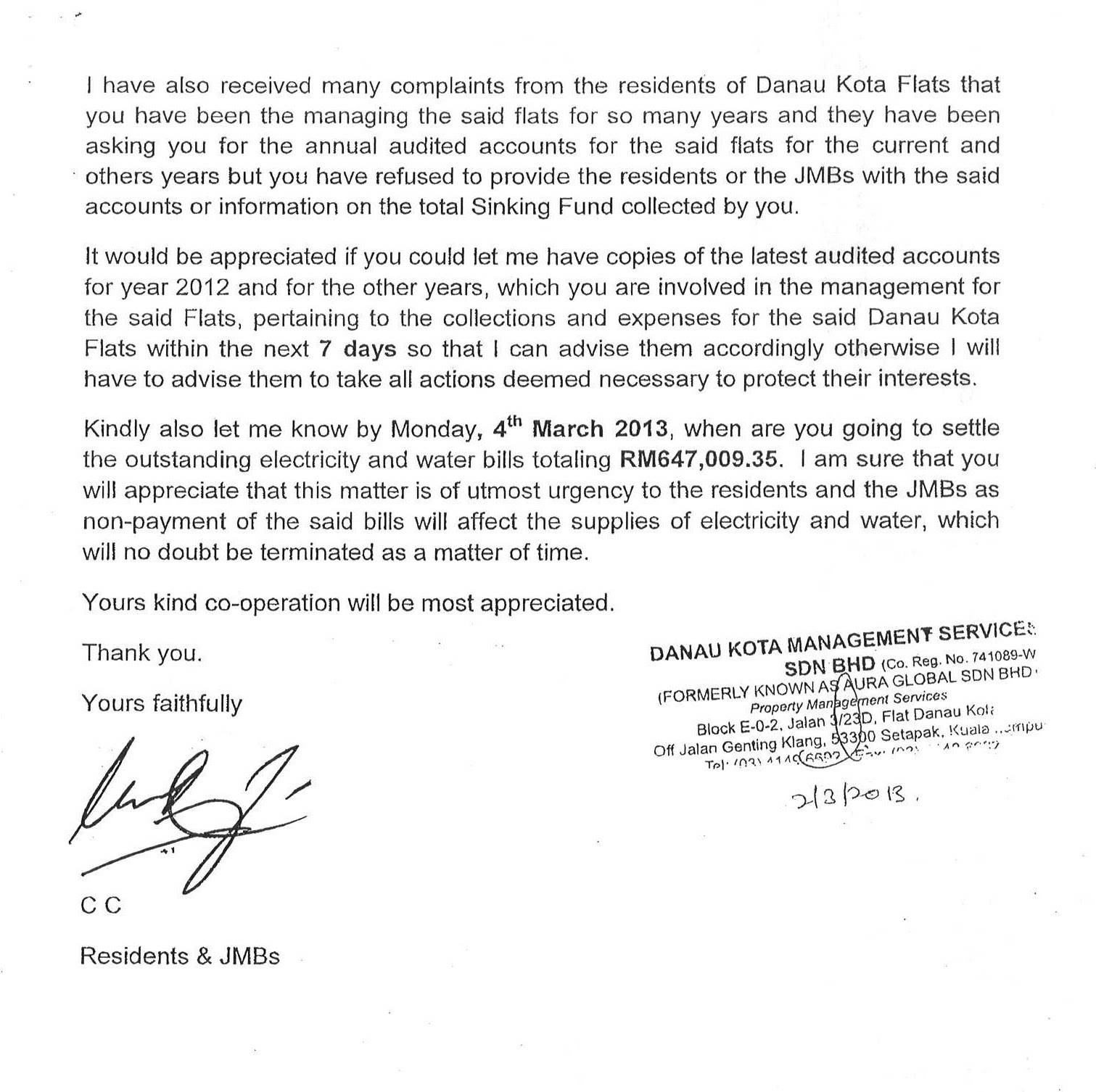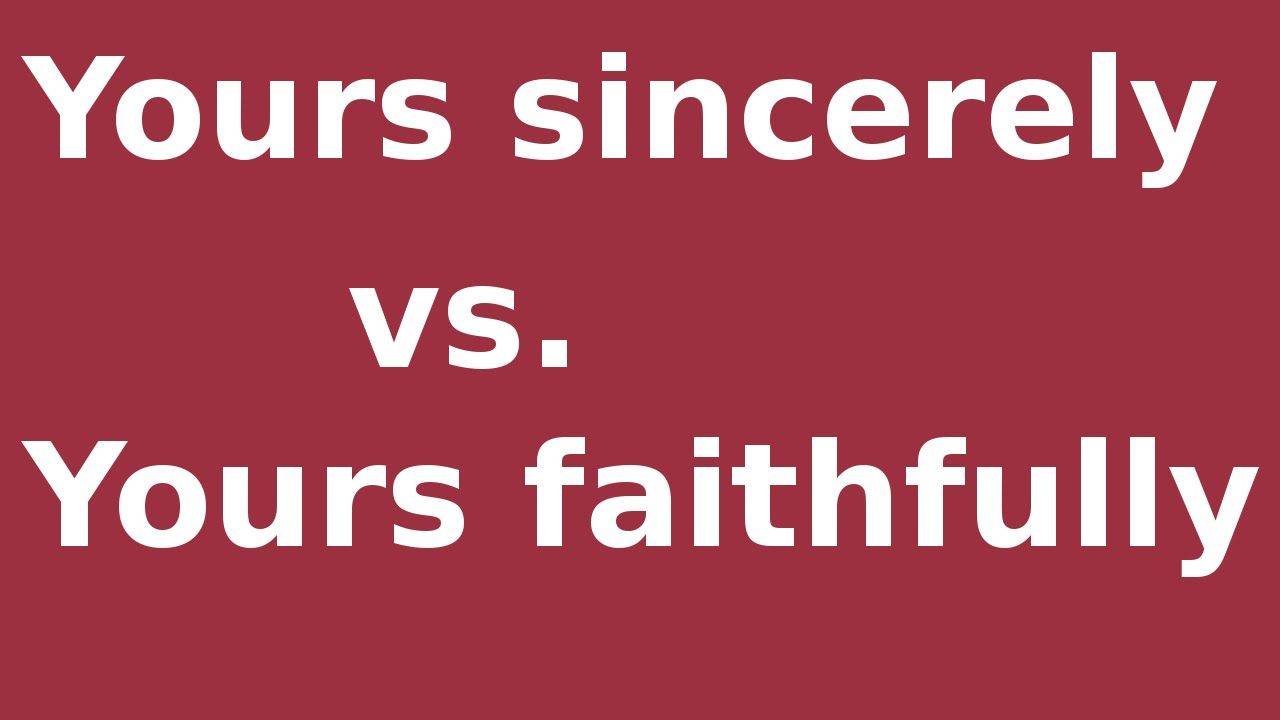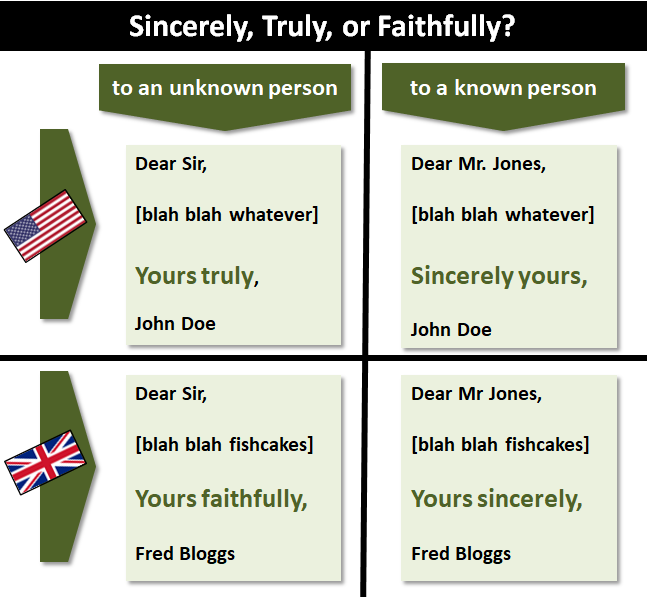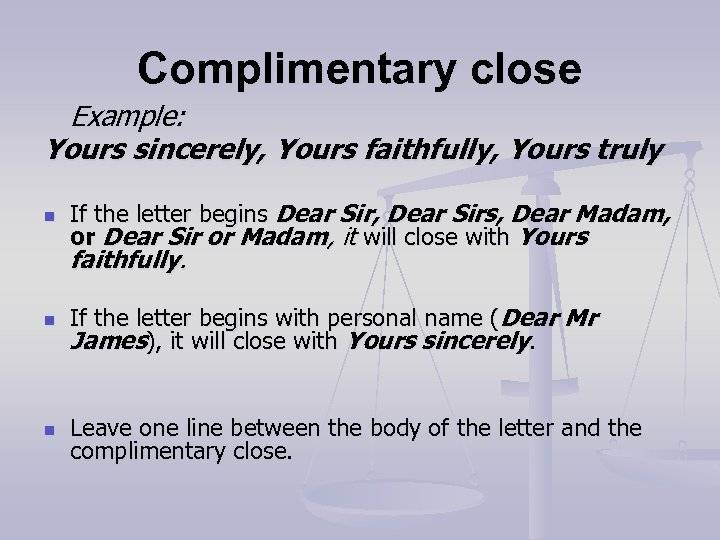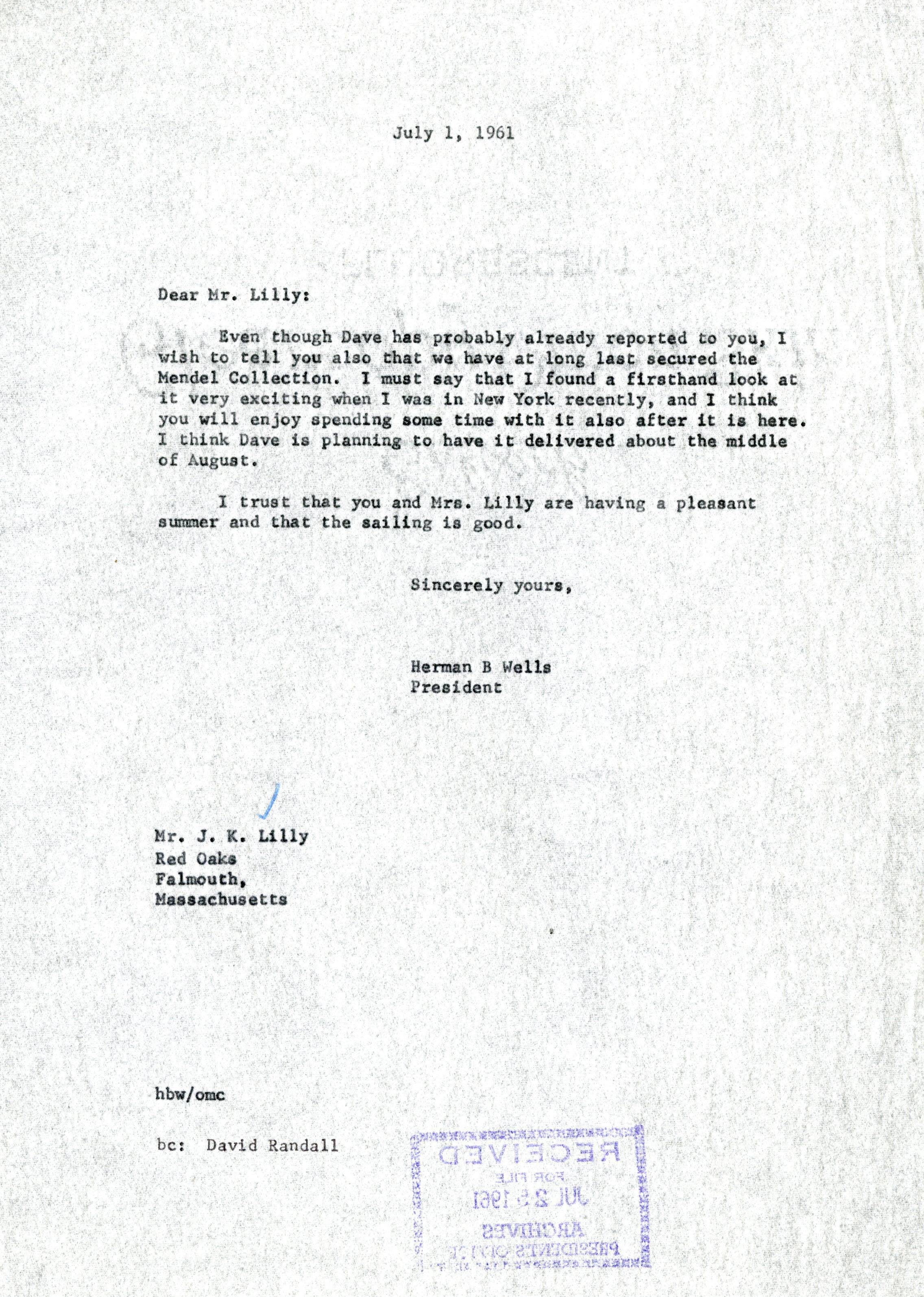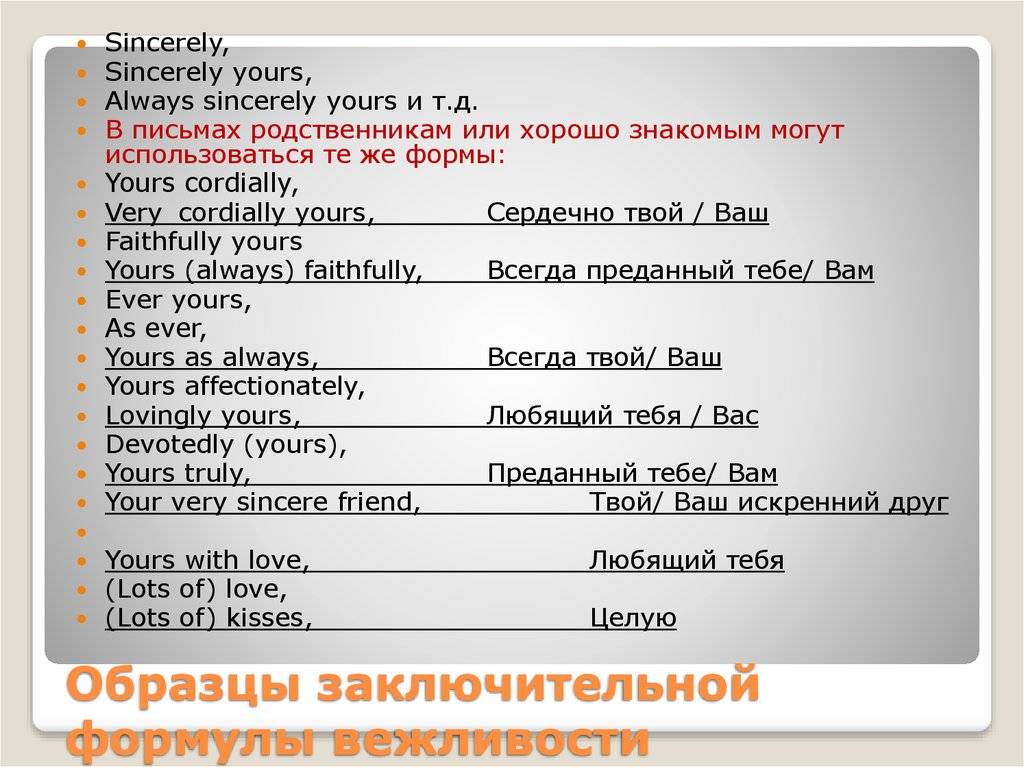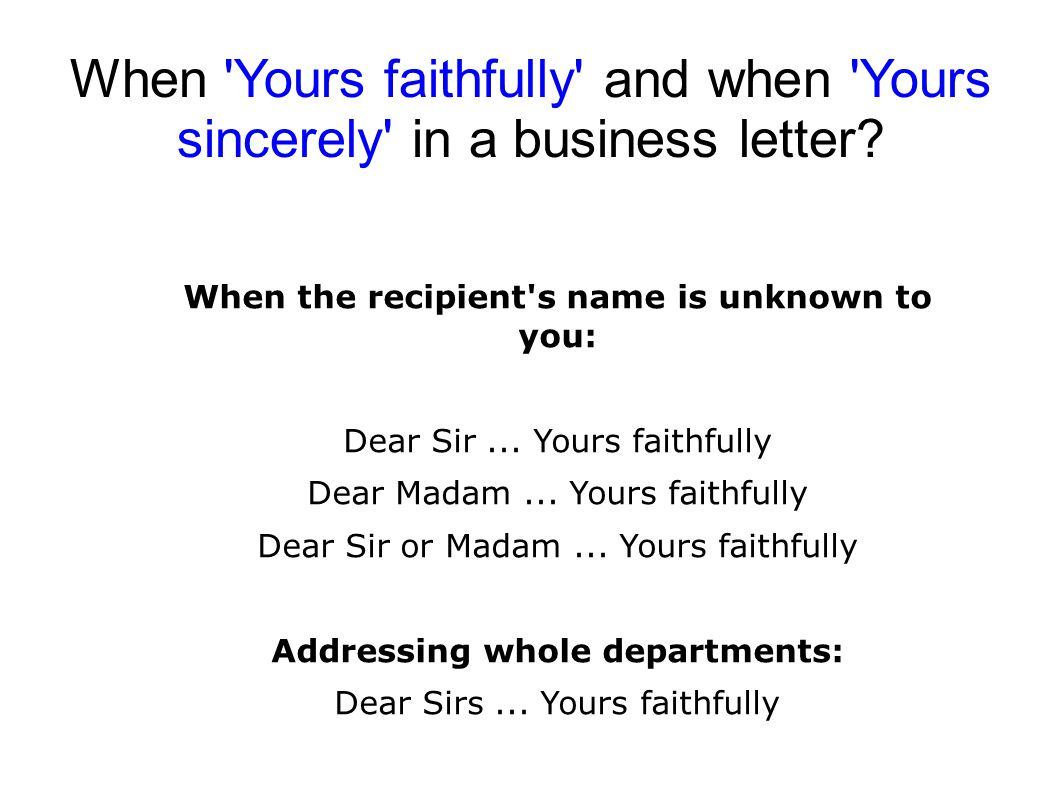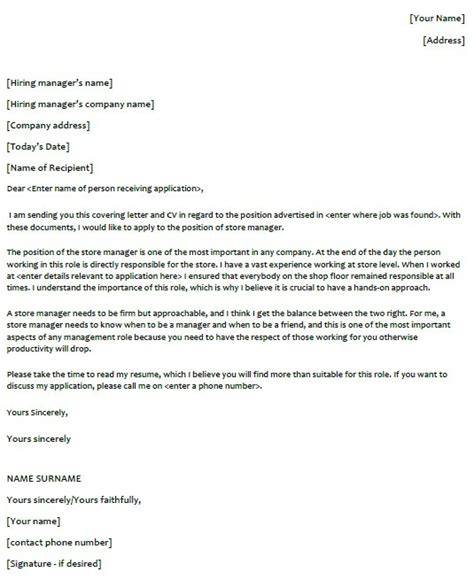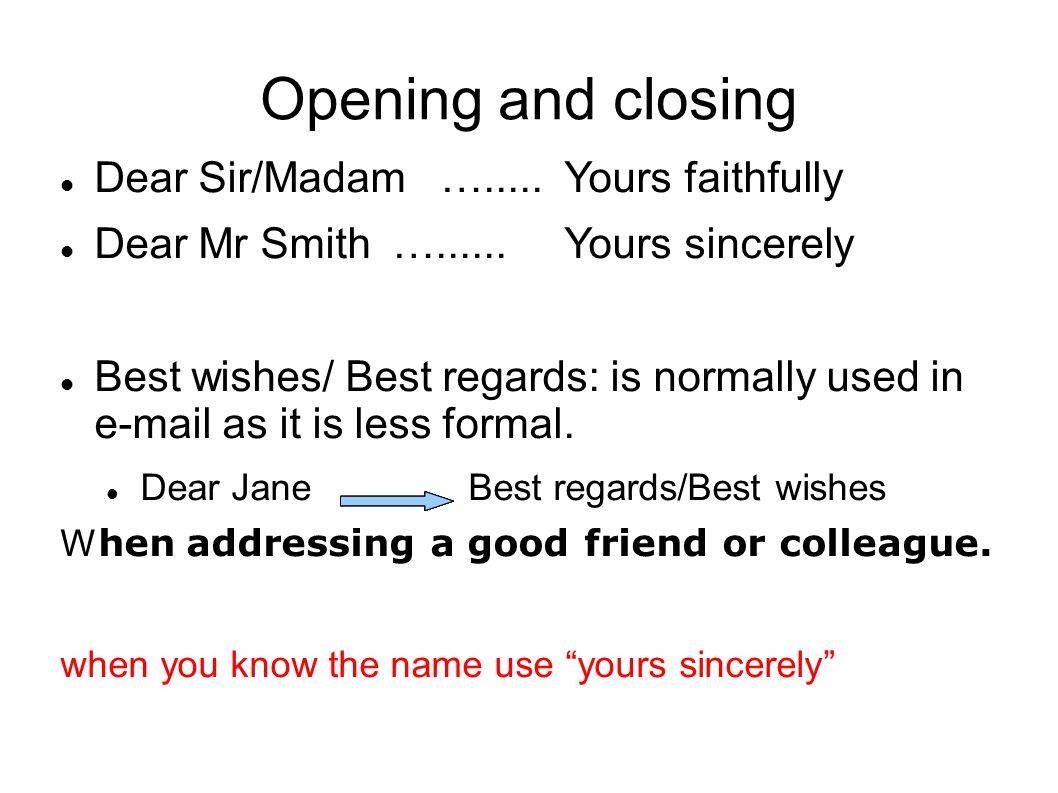When To Use “Yours Sincerely” And “Sincerely Yours”
“Yours sincerely” works when we do know the name. Some people also sign it backward and use “sincerely yours,” though this isn’t a common trope.
You should use “yours sincerely” when addressing someone by their name or with a personal title. Addressing some like “Mr. Smith” or “Daniel Webster” are appropriate times to use “yours sincerely” at the end of your letter.
Whether we only know the surname or the full name doesn’t matter. As long as we know an element of their personal name, we are able to use “yours sincerely” to sign off the letter.
The content of the letter will be much the same as what you can expect from “yours faithfully.” Nothing changes in the contents. It’s simply related to who you address and whether you’re familiar with them.
Some examples might help to make sense of this:
- Dear Mr. Jackson,
- I hope this letter finds you well. I’m more than happy to take you on board as a new client.
- Yours sincerely,
- Freddy Jones
- Dear Jackie Paulson,
- I am writing this letter to tell you all about the discoveries I made when I was abroad.
- Sincerely yours,
- Mr. Tomkins
- Dear Mrs. Harrison,
- I am writing a letter to you now to ask that you reconsider your decision before the council meeting!
- Yours sincerely,
- Milo Mikkelson
“Sincerely yours” and “yours sincerely” are interchangeable. As long as we address the recipient by name, we can use either closing statement to end our letter.
It’s much more likely that you’ll see “yours sincerely” at the end of a letter than “sincerely yours.” Most native speakers put “yours” first because it stays more in line with other phrases like “yours faithfully” and “yours truly.”
What is the difference between Yours Sincerely and Yours Faithfully?
As a matter of fact it is quite common to find the usage of sincerely yours or simply sincerely while signing off. It is also common to find the usage of yours sincerely in social correspondence and yours faithfully in official correspondence. Using of yours sincerely and yours faithfully at the end of a letter depend on whether or not the sender of the letter knows the recipient.
- Yours faithfully is used when writing to someone whom you do not know or have not met.
- Yours sincerely is used when writing to someone whom you have met before or whom you have known or spoken to over phone or was introduced by some other person.
Just keep these two simple facts in your mind and you will know exactly what to use in your next letter.
Образец делового письма на английском языке
Приведу несколько примеров письма, написанных с разной степенью формальности. В письме я сообщу адресату о том, что собрание в пятницу перенесено с 9:00 на 10:30. Тема у всех писем будет одинаковой: Meeting Time Changed to 10:30 a.m.
1. Очень формально.
Dear Mr. Jefferson,
Would you be so kind as to let me know if you will be able to attend it? Please accept my apologies for the inconvinience.
Sincerely,
Sergey Nim
Roga and Kopyta Inc.
Формальности этому письму придают:
- Обращение Dear Mr. Jefferson.
- Фраза I hope this email finds you well — более формальный вариант фразы I hope you are doing well.
- Оборот would you be so kind as — не будете ли вы так любезны.
- Извинение Please accept my apologies — пожалуйста, примите мои извинения.
- Sincerely в конце письма, название компании.
2. Менее формально.
Hello Alex,
This is Sergey from Roga and Kopyta Inc. I wanted to update you on the meeting we are having on Tuesday. Due to the weather conditions the meeting has been moved from 9:00 a.m. to 10:30 a.m.
Please let me know if you will be able to attend it. Sorry for the inconvinience.
Best regards,
Sergey.
Формальность снижена за счет:
- Более простого обращения, обращения по имени.
- Sorry вместо «accept my apologies».
- Менее торжественного завершения письма: best regards.
Большинство деловых писем пишутся в таком тоне. Средневековые формулы вежливости по сути уже никому не нужны.
3. Неформально, но в рамках приличия деловой переписки, например знакомому коллеге.
Daniel,
I just wanted to let you know that the Friday meeting had beed moved to 10:30 a. m. I’m really sorry about that. Will you be able to attend it?
Sergey.
Коротко и по существу. У коллег, которых вы видите на работе каждый день, не обязательно интересоваться каждый раз в письме, как у них дела.
Два вида деловой переписки на английском языке
Кому вообще нужно уметь писать деловые письма на английском? Как правило, людям, которым это необходимо по работе. Предположим, вы устроились в некую компанию, в обязанности входит переписка на английском по разным рабочим вопросам. Все деловые письма можно условно разделить на две большие категории:
- Письма в свободной форме.
- Письма по шаблону: заявки, отчеты и т. д.
На мой взгляд, есть смысл научиться писать письма в свободной форме, а шаблонные письма проще изучить уже в процессе работы, потому что они везде разные и просто нет смысла пытаться выучить все шаблоны. Как правило, в каждом предприятии есть некое «устаканившееся» представление о том, как следует писать разные заявки-отчеты, даже поздравления, а в 90% случаев просто набор готовых бланков в формате doc или xls, в которых нужно только подставлять цифры и фамилии.
Key Differences
“Yours Sincerely” is traditionally used in correspondence where the writer knows the recipient or their name. It’s a formal, polite way to conclude communications, demonstrating a certain level of familiarity and respect. Conversely, “Yours Faithfully” is employed when the recipient is unknown, reflecting respect while acknowledging the lack of personal acquaintance.
12
“Yours Sincerely” is often seen as a sign of professionalism and formality in business communications, suitable for instances where there is some degree of prior interaction or knowledge of the recipient. “Yours Faithfully,” while also formal, is more indicative of the writer’s loyalty or duty to the recipient, even without prior interactions, making it appropriate for communications like job applications or inquiries to unknown parties.
11
“Yours Sincerely” conveys a sense of sincerity in the writer’s tone, implying honesty and genuineness in the preceding message, suitable for situations where a rapport has been established. On the other hand, “Yours Faithfully” tends to imply dedication and steadfastness, suggesting the writer’s faithful respect toward the recipient, irrespective of a personal connection.
9
“Yours Sincerely” is commonly used in American English, where closing salutations in formal letters often require an acknowledgment of the relationship between the parties. In contrast, “Yours Faithfully” is more common in British English, used when the recipient’s identity is unknown, maintaining a respectful formality in communication.
15
Both “Yours Sincerely” and “Yours Faithfully” have their roots in formal correspondence, and choosing between them depends on the writer’s relationship with the recipient. “Yours Sincerely” closes letters where there’s familiarity, while “Yours Faithfully” is reserved for situations where the recipient’s identity is anonymous or unknown.
7
ADVERTISEMENT
ОБРАЩЕНИЕ
Тоже без вопросов — a must. Здесь есть два варианта:
- Если вы пишете человеку впервые и никогда с ним до этого не общались, лучше всего выбрать вариант Dear. При этом dear в английском языке обязательно дополняется именем собеседника: Dear Elizaveta/ Dear Anna/ Dear Vladimir и т.д.
- Если вы уже общались и, возможно, установили профессионально-дружеские отношения, можно написать Hi. Однако еще лучше в этом случае использовать фразу Good morning, Elizaveta. В Великобритании с утра до 12 дня — morning, с 12 до 16:00 — afternoon, а с 16:00 и далее — evening.
В случае если это уже десятый имейл за день, можно написать просто имя и поставить запятую.
Тело письма. Способы вежливого обращения
В первой строке адреса пишется имя и фамилия получателя, если они вам известны. Перед инициалами получателя обычно ставится форма вежливого обращения. После него могут писаться имя и фамилия корреспондента или его инициалы и фамилия, но, ни в коем случае, не одна фамилия.
Например:Mr. J.R. Tolkien,Mr. John Tolkien, но не Mr. Tolkien
Другие формы вежливого обращения:
Mrs. — должностное лицо — замужняя женщина,Miss — должностное лицо — незамужняя женщина,Ms. — должностное лицо — женщина, чье семейное положение вам не известно,Messrs (сокр. от messieurs “господа”) — используется при адресации к двум или более мужчинам.
Существует множество других форм вежливого обращения. Это ученые и медицинские степени, воинские звания, аристократические титулы.
Если имя получателя неизвестно, то просто указывается его должность или отдел.
В деловой корреспонденции приняты следующие сокращения названий стран:
UA -УкраинаRU — РоссияUS — СШАGB — ВеликобританияCA — КанадаFR — ФранцияIT — ИталияJP — ЯпонияG — ГерманияDM — Дания
Вступительное обращение (приветствие) должно быть полностью согласовано с наименованием получателя в пункте “адрес”.
Письмо адресуется одному человеку (мужчине) — Dear Sir “Уважаемый господин”.
Вы адресуете письмо фирме в целом или нескольким лицам, то используйте обращение Dear Sirs “Уважаемые господа” или Gentlemen.
Обратите внимание, что в американских письмах после обращения ставится двоеточие, а в английских — запятая. Если ваше письмо адресовано женщине, то обращайтесь к ней как Dear Madam, а не Dear Miss, так как это будет звучать некультурно
Обращение к женщинам звучит как Mesdames.
Если пол адресата вам неизвестен, то пишите Dear Sir or Madam.
Если вы пишете человеку, с которым вы знакомы, то можете поставить в обращение его фамилию: Dear Mr. Smith.
При длительном общении (переписке) можно “перейти на ТЫ” — Dear Michael. Можно сделать свое обращение еще более теплым и душевным:My dear Mr. SmithMy dear Michael
Для того, чтобы читатель письма сразу понял, о чем пойдет речь, после вступительного обращения обычно дается краткое указание на общее содержание письма. Чаще всего перед этим указанием употребляются следующие сокращения:
“Re” — сокращение от латинского выражения “in re” — “по делу”;”Subject” — тема;”Conc” — сокращение от английского “concerning” — касательно.
Например:
Conc: your request for the documents of January 21, 1997Subject: labour contract
Первый абзац основного текста начинается с предложения, в котором вы подтверждаете получение письма от вашего корреспондента, или со ссылки на поступившее письмо.
Обычно объем делового письма не превышает одну страницу. Но, если объем письма больше одной страницы и его продолжение напечатано на обратной стороне листа, то в конце первой страницы пишется p.t.o., что означает Please Turn Over (Смотрите на обороте).
Is It Right To Say “Sincerely Yours”?
There is nothing wrong with using “sincerely yours” in your letters, even though it’s not the most common choice for native speakers.
It might help to look through common usage across American and British English. Sometimes, this helps us to understand whether the phrase is worth learning at all.
According to Google Ngram Viewer, “sincerely yours” and “yours sincerely” are used almost identically in American English. However, neither phrase is particularly popular, as you can see from the rapid decline over the last 200 years.
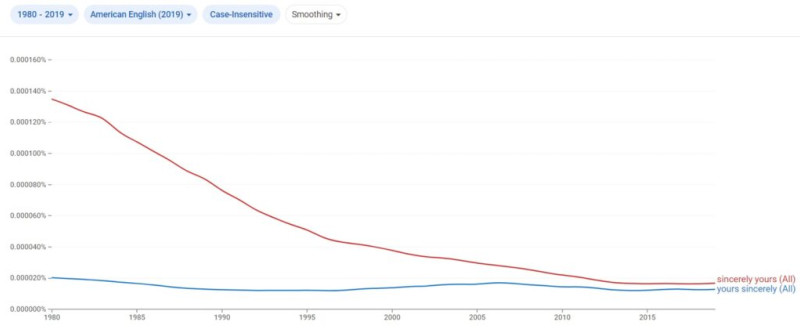
While American English doesn’t have a preference between the two, British English clearly favors “yours sincerely.”
The exact reason why this is the case is unclear, though it’s taught that “yours sincerely” is the only correct option in British schools. American English like to sway away from standardized rules, so they might have introduced “sincerely yours” as their own unique language construct.
Структура делового письма

Имя и адрес отправителя
Реквизиты отправителя и располагается в верхнем левом углу.
Последовательность реквизитов следующая:
- имя руководителя;
- его должность;
- название компании отправителя;
- номер дома, улица;
- город, почтовый индекс;
- страна.
Пример:
Mr Viktor Moskvin
Director
School of foreign laguages “Lingva”
154 Sadovaya St
Moscow 123456
Russia
Отсутствие знаков препинания в деловом письме называется «открытой пунктуацией».
Дата
Дата располагается под реквизитами, отступ три строки. Вариантов написания даты несколько:
- July 28, 2017;
- July 28th, 2017;
- 28 July, 2017;
- 28th July, 2017.
Адрес получателя
Адрес получателя пишется после даты следующим образом:
- полное имя получателя;
- должность;
- название компании;
- номер дома, улица;
- город, почтовый индекс;
- страна.
Перед именем обязательно указывается сокращенное обращение:
- Mr. (мистер, господин),
- Dr. (доктор),
- Ms. (мисс, для незамужней женщины),
- Mrs. (миссис – для замужней женщины или если не уверены в статусе).
Пример:
Mrs Jennifer Grey
editor publishing company “GoodBook”
25 Downing St
London SW1A 2AB
United Kingdom
Расположение адреса аналогично написанию адреса отправителя.
Обращение к адресату письма
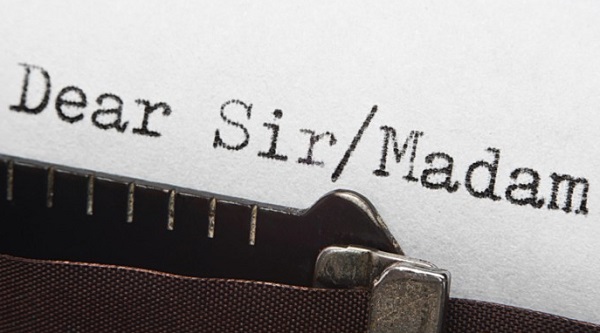
- Обращение к адресату начинается начинается со слова «Dear…»(уважаемый(-ая)): Если указано полное имя получателя, то приветствие начинается именно так, с личного приветствия: Dear Mrs Jennifer Grey.
- Если имя неизвестно, то в письме обращаются неопределенно: Dear Sir or Madam.
- В случае обращения на имя компании, обращение является общим: Dear Sirs.
- Если письмо адресовано американской компании, в конце обращения ставится двоеточие: Dear Mrs Jennifer Grey:
Название должности отправителя
Если письмо составлено мужчиной, то слово Mr не ставится. Если письмо составлено женщиной, то после имени в скобках стоит (Mrs). Точка в конце предложения не ставится. Например: Yours sincerely,
Viktor Moskvin
Director
School of foreign laguages “Lingva”, или
Yours sincerely, Nikole Noble (Mrs)
Director
School of foreign laguages “Lingva”
Отметка о приложениях
Деловое письмо может сопровождаться другими документами. Для указания этого в деловой переписке после подписи пишется сокращение Enc или Encs («Enclosures» — «Приложения»). После этой надписи ставится запятая и перечисляются все документы, прилагаемые к основному письму. Например:
Yours sincerely,
Viktor Moskvin
Director
School of foreign laguages “Lingva”
Enc, a copy of the license.
Приветствие (обращение)
Если имя адресата неизвестно, то лучше всего начать письмо:
Dear Sir, Dear Sirs, Dear Madam
(как для замужней, так и незамужней женщины).
Никогда не используйте обращение Dear Miss. В том случае, когда Вы не знаете пола адресата, лучше употребить обращение Dear Sir. Формы обращения Sir и Madam (без Dear) более официальны, и злоупотреблять ими не стоит.
Можно также обращаться к адресату по его должности:
Dear Professor, Dear Mr.President.
Если адресат Вам знаком, гораздо предпочтительнее обращаться к нему по фамилии:
Dear Mr.Smith, Dear Mrs.Smith, Dear Miss Smith.
Приветствие всегда отделяется запятой, но в американской деловой корреспонденции часто можно встретить двоеточие
Dear Mr. Smith: .
What is the difference between ‘Yours Faithfully’ and “Yours Sincerely”?
‘Yours faithfully’ is used in business and other formal letters while ‘Yours sincerely’ is used in friendly letters. 3. ‘Yours faithfully’ is used with the salutation ‘Dear Sir’ or ‘Dear Madam,’ while ‘Yours sincerely’ is used with the salutation ‘Dear Mr/Miss/Mrs/Ms’ followed by the name of the person. 4.
How do you use yours faithfully in a sentence?
British Usage. “Yours faithfully” is used when the letter is not specifically addressed to an individual, for example, “Dear Sir” or “Dear Madam”. “Yours faithfully” is used far less in American English, although you may see it from time to time. When you do know the name of the recipient close the letter with “Yours sincerely”.
What is the American equivalent of Yours Sincerely?
Yours truly is the American equivalent of “yours faithfully” that I was taught by my American business teachers. When I begin a letter “Dear Sir,” I close it with “Yours truly.” When you do know the name of the recipient… Yours sincerely is also British.
Exceptions To The Rules
While the rules for using “faithfully” and “sincerely” are generally straightforward, there are some exceptions to keep in mind. Here are a few cases where the rules may not apply:
1. Personal Relationships
In personal relationships, the rules for using “faithfully” and “sincerely” may not be as rigid. For example, in a romantic relationship, one might sign off a letter with “Love” instead of either “faithfully” or “sincerely.” In this case, the sentiment of the message is more important than strict adherence to grammar rules.
2. Creative Writing
In creative writing, authors may choose to use “faithfully” or “sincerely” in a non-traditional way for stylistic purposes. For example, a character in a novel might sign off a letter with “faithfully yours” in a sarcastic or ironic tone to convey their true feelings. In this case, the author is intentionally breaking the rules for creative effect.
3. Cultural Differences
In some cultures, the rules for using “faithfully” and “sincerely” may differ from standard English usage. For example, in some Asian cultures, it is common to use phrases such as “yours truly” or “with best regards” instead of “faithfully” or “sincerely.” It’s important to be aware of cultural differences when communicating with people from different backgrounds.
4. Business Correspondence
While “faithfully” and “sincerely” are commonly used in business correspondence, there may be cases where other phrases are more appropriate. For example, if the letter is from a company to a potential client, it may be more effective to use a phrase such as “looking forward to doing business with you” instead of “sincerely.” In this case, the goal is to establish a positive relationship with the recipient.
Overall, while the rules for using “faithfully” and “sincerely” are generally straightforward, there are some exceptions to keep in mind. By being aware of these exceptions, you can communicate more effectively with a variety of audiences.
Общие слова и фразы для деловой переписки
Thank you for your letter of (date), asking if…
Спасибо за письмо от (дата), в котором вы спрашиваете …
We have received your letter of (date), enclosing…
Мы получили Ваше письмо от (дата), к которому вы прилагаете…
We are writing to enquire about…
Мы Вам пишем, чтобы узнать о…
We are interested in…
Мы заинтересованы в…
We would like to know…
Мы бы хотели знать…
In reply to your letter of (date)…
В ответ на Ваше письмо от (дата)…
We would like to inform you…
Мы бы хотели Вас проинформировать…
We are sorry to have to remind you…
Простите за то, что напоминаем Вам…
We regret to inform you that…
Сожалеем о том, что должны Вам сообщить, что…
We refer to your order №123…
Ссылаясь на Ваш заказ №123…
With reference to your letter…
Ссылаясь на Ваше письмо…
With reference to your advertisement in…
Ссылаясь на Вашу рекламу в…
We refer to our telephone conversation regarding…
Мы ссылаемся на наш телефонный разговор касательно…
Replying to your letter of … we are pleased to inform you that…
Отвечая на Ваше письмо от…мы рады сообщить Вам, что…
In reply (response) to your letter of… we are pleased to inform you that…
В ответ на Ваше письмо от…мы рады сообщить Вам, что…
In accordance with your request we…
В соответствии с Вашим запросом мы…
We confirm our fax message received this morning…
Мы подтверждаем получение Вашего факса сегодня утром…
Confirming…we are pleased now to…
Подтверждая…, мы рады…
May we remind you that…
We wish to notify you that…
a) извинения
We apologise for…
Мы извиняемся за…
Please accept our apologies/apology for…
Пожалуйста, примите наши извинения за…
Please accept our apology and our assurance that we will be more careful in the future.
Пожалуйста, примите наши извинения и заверения в том, что в будущем мы будем более осмотрительны.
Apologising for… we…
Извиняясь за…, мы…
We very much regret to say that…
С большим сожалением мы сообщаем, что…
We are sorry for a delay…
Мы сожалеем о задержке…
We were sorry to receive your complaint…
С сожалением мы получили Вашу жалобу…
We hope you will understand that we were not responsible for…
Мы надеемся, что Вы понимаете, что мы не несем ответственности за…
We assure you that we do all we can to…
Заверяем вас, что мы делаем все возможное, чтобы…
b) выражение просьбы
Wouldwill you please, be so kind to…
Не будете ли Вы так любезны…
We would be pleased if you would…
Мы были бы рады если бы Вы…
We shouldshall be obliged (grateful) if you wouldcould…
Мы будем благодарны Вам, если Вы…
It will be appreciated if you can…
Мы высоко оценим, если Вы…
It would be appreciated if you wouldcould…
Мы были бы очень благодарны, если бы Вы смогли…
We would (very much) appreciate your advice…
Мы будем Вам (очень) благодарны за совет…
In view of the urgency we ask you to…
В виду необходимости мы просим Вас…
We trust you will…
Мы рассчитываем, что Вы…
с) упоминание о приложении к письму
We are enclosing we enclose…
Мы прилагаем…
I enclose my curriculum vitae…
Я прилагаю свое резюме…
We attach to this letter…
Мы прилагаем к этому письму…
Please find enclosed…
Пожалуйста, ознакомьте с приложенным…
I look forward to receiving your reply.
С нетерпением жду Вашего ответа.
Looking forward to hearing from you.
С нетерпением жду от Вас письма.
I hope this information will help you.
Надеюсь, эта информация поможет Вам.
Please, do not hesitate to contact me if you need further information.
Если Вам нужна дальнейшая информация, пожалуйста, пишите нам без колебаний.
Please, feel free if you have any further questions.
Если у Вас есть какие-либо вопросы, пожалуйста, не стесняйтесь их задавать.
If there is any advice or further information you want we shall be happy to supply it.
Если Вы хотите получить какую-нибудь дополнительную информацию или совет, мы будем счастливы их Вам предоставить.
We would appreciate a prompt reply.
Будем признательны за Ваш незамедлительный ответ.
а) выражение благодарности
Thank you again for your help. We will be ready to serve you in every way possible
Еще раз спасибо за Вашу помощь
Будем рады помочь Вам всем, чем сможем
Thank you for your assistance
Спасибо за Вашу помощь
Many thanks for your earliest attention
Большое спасибо за Ваше внимание
We assure you of our best attention at all times
Заверяем Вас в нашей преданност
Best regards
С наилучшими пожеланиями
Репетиторы по английскому языку на Study.ru.
В базе 102 репетиторов со средней ценой 1133
What’s the difference between yours faithfully and yours truly?
Use “Yours faithfully” ( ) or “Yours truly” ( ) for Unknown Recipients. If you do not know the name of the recipient (typically in business correspondence), use “Yours truly” (US) or “Yours faithfully” (UK). (Note: The use of “Yours faithfully” is growing increasingly popular in the US, but “Yours truly” is preferred.)
When should you use yours sincerely?
“Yours sincerely” is typically employed in English when the recipient is addressed by name (e.g. “Dear John”) and is known to the sender to some degree, whereas “Yours faithfully” is used when the recipient is not addressed by name (i.e., the recipient is addressed by a phrase such as “Dear Sir/Madam”) or when the …
What’s another way of saying sincerely?
What is another word for sincerely yours?
| sincerely | regards |
|---|---|
| best wishes | kindest regards |
| kind regards | respectfully |
| yours faithfully | best regards |
| yours sincerely | yours truly |
Does silence make a girl miss you?
To summarize, does silence make a woman miss you? Yes, silence does make a woman miss you if she took you for granted and now has to bear the loss of your presence from her life. In fact, silence gives a woman an opportunity to reconsider her opinion of and feelings for you if she has initially lost interest.
Приветствие
В английском языке даже незнакомые люди нам очень дороги, поэтому британцы и американцы сразу так и обращаются к тому, с кем впервые начинают формальное общение:
Dear Sir or Madam — фраза на случай, если неизвестно, кто наш адресат: мужчина или женщина, и как его зовут.
Скажем прямо: такое обращение — редкость или даже лень, ведь сейчас всё можно найти в соцсетях. Данный секретный прием применяем только в том случае, когда не удалось найти никаких имен. Если все титулы и имена известны, начинаем сообщение так:
Dear Mr. или Ms. + фамилия (можно и имя, если хотите). Например, Dear Ms. Jamie Adams.
Как прочитать вслух адрес электронной почты на английском?
- Символ ‘@’ читается как at, ни в коем случае не dog!
- Точка в адресе электронной почте называется dot, а не point, full stop или period (о разнице между этими словами читайте здесь).
- Символ ‘-‘ читается как hyphen, иногда не вполне корректно называют dash (dash — это тире, то есть более длинный вариант hyphen).
- Символ ‘_’читается как underscore, реже: understrike, low dash, low line.
Примеры:
Я думаю, что если вы читаете статью о деловой переписке, английский алфавит вы точно знаете
Общеизвестные доменные зоны com, net, org читают как слово, не по буквам. Менее известные, например ru, обычно по буквам.
When To Use “Yours Truly”
There is another option that we haven’t covered yet. “Yours truly” is a fairly popular phrase, and seeing how we use it in different languages will show you why.
According to Google Ngram Viewer, “yours truly” is vastly more popular than both “sincerely” and “faithfully” in American English. That’s because “yours truly” is the equivalent of “yours faithfully” to most American English speakers.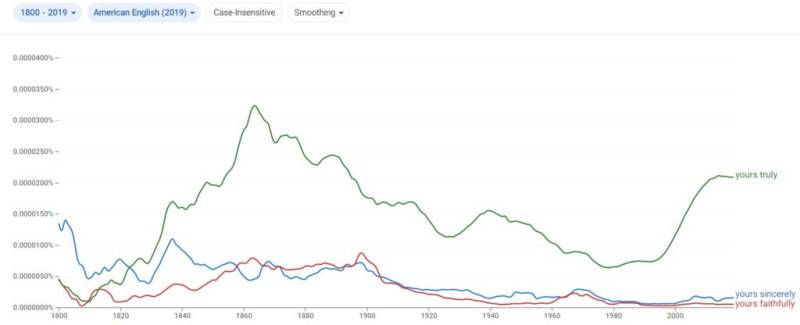
According to Google Ngram Viewer, “yours truly” is still more popular than the other two choices but much less popular overall in British English. It seems that all three phrases are used almost to the same degree, and British English has no particular preference.
You should use “yours truly” when you do not know the name of the recipient of your letter, just like “yours faithfully.” However, it’s much more likely that you’ll come across this in American English rather than British English.
Some examples might help you to understand it better:
- Dear sir,
- I hope this letter reaches you in time, as what I have to say is of high value.
- Yours truly,
- Madam Lopez
- To whoever receives this letter,
- I hope that I’m not out of line here, but I have many issues that I’d like to raise before the next government meeting.
- Yours truly,
- Mr. Harper
- Dear sir/madam,
- I am writing this formal letter to criticize the abysmal performance of the staff I’ve noticed in your establishment in recent times.
- Yours truly,
- Karen Sinister
Context Matters
Examples Of Different Contexts
Here are some examples of different contexts in which the choice between ‘faithfully’ and ‘sincerely’ might change:
- Business Correspondence: In formal business correspondence, ‘faithfully’ is usually used to close a letter when the writer is known to the recipient. On the other hand, ‘sincerely’ is used when the writer is not familiar with the recipient.
- Religious Contexts: ‘Faithfully’ is often used in religious contexts to express devotion and loyalty to a particular faith. For instance, a Christian might say, “I faithfully attend church every Sunday.”
- Legal Documents: In legal documents, ‘faithfully’ is often used to indicate that the person signing the document is bound by it. For instance, a witness might say, “I faithfully swear to tell the truth, the whole truth, and nothing but the truth.”
- Social Etiquette: In social contexts, ‘sincerely’ is often used to express genuine feelings of gratitude or appreciation. For instance, a person might say, “I sincerely thank you for your help.”
As you can see, the choice between ‘faithfully’ and ‘sincerely’ depends on the context in which they are used. It is important to choose the right word to convey the intended meaning and tone of the message.
ВВОДНАЯ ФРАЗА
Здесь, повторяя известный мем, нельзя просто так взять и написать чего вы хотите от собеседника. Это считается невежливым. Используйте вводные фразы.
Самая удачная, на наш взгляд, — это I hope you are well/я надеюсь у тебя все хорошо. Используя I hope you are well, выговорите «я надеюсь, у тебя все хорошо, и не жду никаких подробностей». Не пишите How are you, кроме тех случаев, когда вы действительно обращаетесь к близкому другу. Этот вопрос побуждает собеседника обязательно рассказать вам how she/he is.
Если вы встречались лично или разговаривали по телефону, можно использовать вводную фразу Thank you for your time и добавить пару слов о встрече или разговоре.
